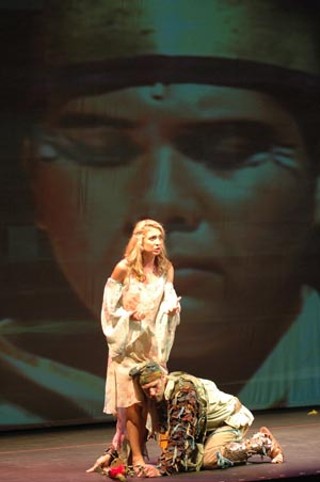The Magic Flute
Twenty-first century tech doesn't serve Mozart's 18th century opera, but the human artists make magic
Reviewed by Michael Kellerman, Fri., Sept. 21, 2007

The Magic Flute
McCullough Theatre, through Sept. 23
The Magic Flute is the ideal opera for an experiment. A simple comic fable steeped in fantasy, the work is Mozart's ode to the imagination. For this production, UT's Butler Opera Center brought together artists, designers, and technicians from Costa Rica, Mexico, and the U.S. to reimagine Mozart's classic for the 21st century. Before the overture began, the nearly sold-out theatre was abuzz with talk of cutting-edge design, a lighting system with a hip tech name (DL.2), and, of course, the much-anticipated giant digital Queen of the Night.
The premise was ambitious: Set a classic, well-loved opera in two dimensions, strung together with tools of the Digital Age. The five characters of the story's real world are the only ones who appear live onstage, set against digital set-pieces. The remaining characters perform offstage and are projected in real time onto screens. The score, reorchestrated for string quartet and two keyboards, also is packaged for efficiency and mobility. Even the libretto has been reworked, updating the light fable with pop references and modern humor.
There is an inherent challenge with this technological revamp, however: Does the innovation serve the art? In this case, unfortunately, the answer is no.
For each of the offstage performances, there is a one-second time lag between the performance and what is projected to the audience, creating a frustrating disconnect between sound and image. The sound quality of the offstage performances is inconsistent and unbalanced, as well. Combined with the audio/visual lag, this puts the offstage artists at an unfortunate disadvantage with the live ones.
Visually, there was no limit to what could have been created as virtual set-pieces. The images settled upon – a strange, petri-dish culture forest and a simple stone wall – don't capture the essence of the production, that is, the use of technology to enliven the fantasy.
The scoring also falls short of its intention. The synthesized, condensed orchestration accompanied by live strings sounds like, well, two keyboards and a string quartet. The depth of a full chamber orchestra is lost in the new setting.
For all the technological interruption, however, this Flute's triumphs all belong to the humans. The performances are universally solid, with some magical standouts. Benjamin Westbrook, as Tamino, is vocally robust and heartfelt. In the diva role of the Queen of the Night, Nicole Taylor nails the playfully wicked tone, not to mention all of the high Fs, with confidence and clarity. Julie-Anne Hamula, the queen's love-torn daughter, Pamina, soars through the piece with a technically sound, rich performance. The worthy recipient of several bravos, Matthew Neumann is brilliant as the bird man Papageno. A natural, charismatic actor with scene-stealing stage presence, Neumann obviously is having a ball and even throws in some well-timed acrobatics to the role. His vocals are assured and richly painted, capturing the ups and downs of his character's own quest for true love in a believable and honest way.
This project was, in theory, a scintillating idea born of the desire to innovate for the next generation of audiences. In the end, the technology did little to enhance the experience and left me longing for an old-school setting (a rare, traditionalist moment). Much credit is due the artistic team for risking so much on a new concept, but for the future, I hope the technical standards will match the creative capacity of the performers, who were clearly up to the challenge.










